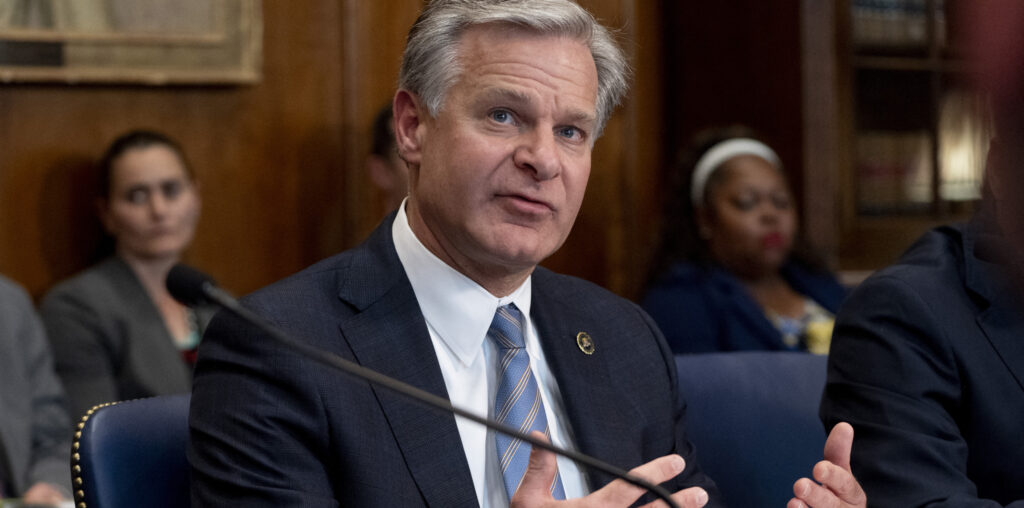The FBI and the Department of Homeland Security (DHS) are under fire from Senate lawmakers after declining to testify publicly at a scheduled hearing on national security threats.
The decision marks a significant dismissal of a longstanding convention.
Senate Homeland Security and Governmental Affairs Committee Chairman Gary Peters said the decision “robs the American people of critical information” and sidesteps “the opportunity for public accountability” on how America is kept safe.
Peters, a Michigan Democrat, said this was the first time in more than 15 years that an FBI director and Homeland Security secretary had together made a refusal.
The hearing typically acts as a platform for agency heads to address Congress on pressing security concerns. Topics range from weapons of mass destruction to cyberattacks. Instead, DHS Secretary Alejandro Mayorkas and FBI Director Christopher Wray opted for a classified setting.

ROBERTO SCHMIDT/AFP via Getty Images
How Did the FBI and DHS Respond?
Their decision comes during a politically charged period––Republican President-elect Donald Trump is interviewing candidates to replace Wray, and recently named South Dakota Governor Kristi Noem as his pick to succeed Mayorkas if re-elected.
The FBI defended its position in a statement.
“FBI leaders have testified extensively in public settings about the current threat environment and believe the Committee would benefit most from further substantive discussions and additional information that can only be provided in a classified setting,” the agency said.
The DHS echoed similar sentiments, noting that the agency and the FBI had shared extensive unclassified information publicly, including the recently published Homeland Threat Assessment.
“DHS takes seriously its obligation to respond to Congressional requests for testimony,” the department said, adding that Mayorkas has testified in Congress 30 times during his tenure.

CHARLY TRIBALLEAU/AFP via Getty Images
A ‘Shocking Departure’ From Tradition
The Senate committee, which usually schedules the hearings months in advance, was informed on Monday of the decision.
A separate House Homeland Security Committee hearing was also postponed to add to their frustrations.
Despite the agencies’ assurances, Peters called the decision a “shocking departure” from tradition. He argued that the classified format prevents the public from understanding how the government is addressing critical threats.
“These hearings have always been a way to inform the American people about the threats we face and how the government is responding,” he said.

Kevin Dietsch/Getty Images
Tensions During Last Year’s Hearing
At last year’s hearing, Mayorkas warned that the U.S. government is at risk of losing key tools for preventing terrorists from using drones, chemicals, or weapons of mass destruction if Congress doesn’t act soon.
He criticized the Senate for stalling a bill (Chemical Facility Anti-Terrorism Standards, or CFATS) designed to regulate chemicals and prevent their misuse in terrorism because a Republican senator worried it might hurt the competitiveness of U.S. chemical companies.
There are about 3,200 high-risk facilities across the country, according to agency data.
Since no agreement was reached, the government’s authority to enforce these rules ended in July. A coalition of organizations urged Senate leaders to reincorporate it––but despite these initiatives, it is yet to be enforced.
“Congress must not allow these DHS authorities to lapse,” Mayorkas said, arguing that they are vital for protecting the country. “This is not a moment to let our guard down.”
This article includes reporting from the Associated Press

